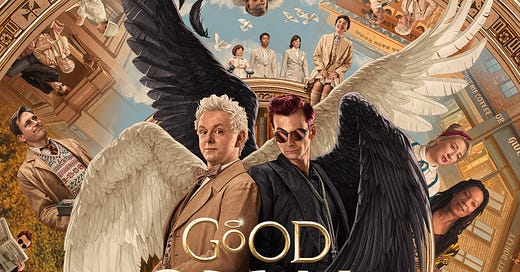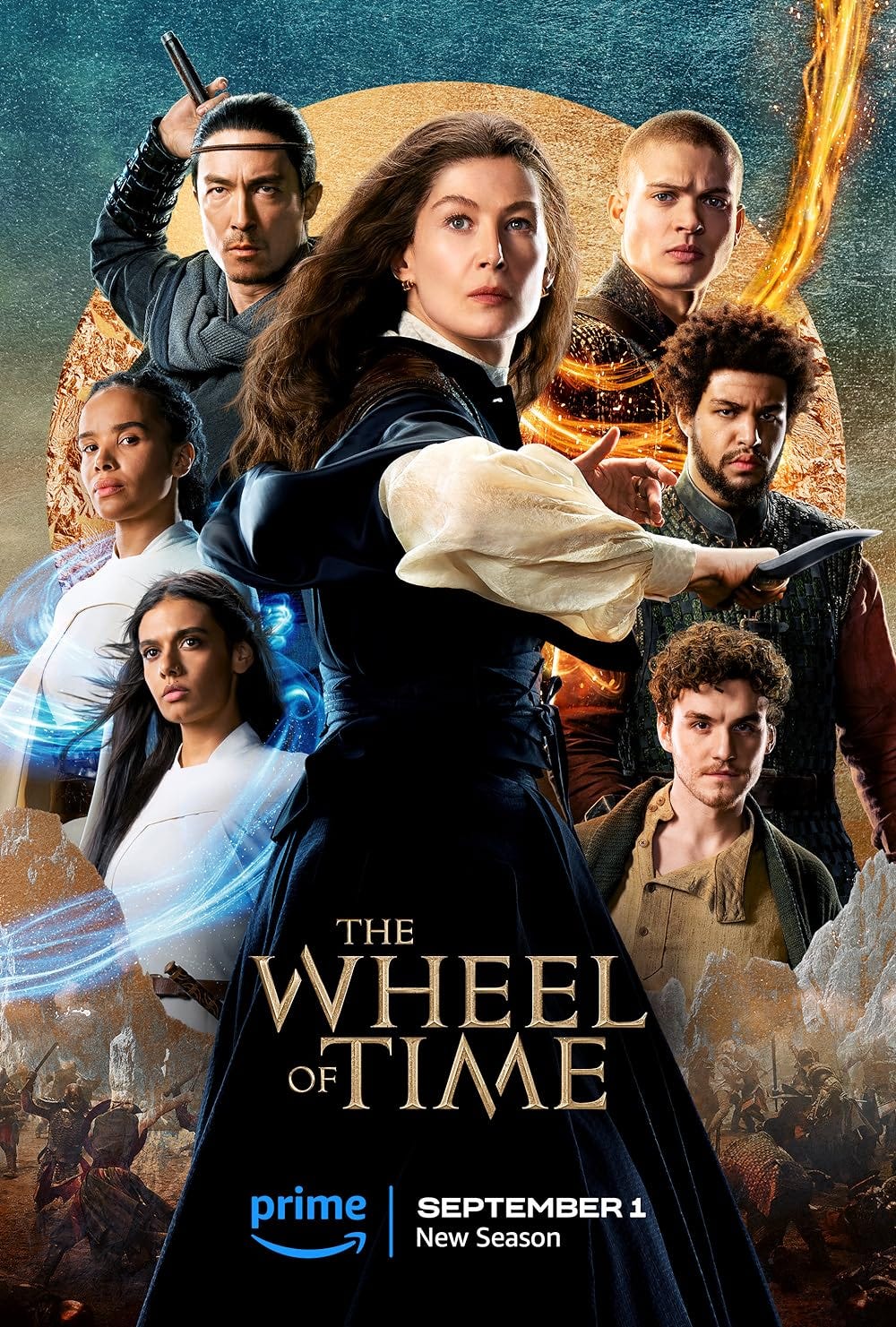"Good Omens," "The Wheel of Time," and the Power of Queer Tragedy
The wrenchingly sad stories of Aziraphale and Crowley and Moiraine and Siuan reveal the remarkable depths of current queer storylines in fantasy television.
Hello, dear reader! Do you like what you read here at Omnivorous? Do you like reading fun but insightful takes on all things pop culture? Do you like supporting indie writers? If so, then please consider becoming a subscriber and get the newsletter delivered straight to your inbox. There are a number of paid options, but you can also sign up for free! Every little bit helps. Thanks for reading and now, on with the show!
Warning: Spoilers for both Good Omens and The Wheel of Time follow!
Like many other fans, I was over the moon when we finally got confirmation that there would indeed be a third season of the Amazon series Good Omens, based on the novel by Terry Pratchett and Neil Gaiman. Fans will recall that the second season ended with angel Aziraphale (played with marvelous panache by Michael Sheen) ascending to Heaven to help bring about the Second Coming, while Crowley, hurt and angry at Aziraphale’s rejection of his offer of love, drives off. It was an achingly painful ending for a season that seemed like it was going to finally end with these two celestial oddities finally confessing the love they so clearly feel for one another. But then, the course of true love never did run smooth, did it?
Aziraphale and Crowley aren’t the only fantasy characters whose story is rather in flux at the end of a season. Elsewhere on Amazon, viewers have been treated to the fraught but deeply resonant relationship between Aes Sedai Moiraine Damodred (played by ~swoon~ Rosamund Pike) and Amyrlin Seat Siuan Sanche (a truly marvelous Sophie Okonedo). As the second season reaches its climax, Moiraine has seemingly betrayed her lover/boss by departing with Rand for Falme–in the company of a Forsaken, no less!--leaving Siuan behind and their romantic and political partnership in ruins.
In both cases, we see a bit of what can be termed “queer tragedy.” Unlike so many other queerly tragic stories, however, these ones don’t end with the characters dead, though they are undoubtedly heartbroken. Moreover, these stories aren’t tragic because they’re queer; they’re tragic because queer people, like people everywhere, often find themselves in situations where they have to choose between their lovers and some higher good. And, as with any good tragedy, there’s no easy answer to the moral questions posed by the stories of Good Omens and The Wheel of Time. Instead, these series force the characters, and through them, the audience, to sit with the irresolvable contradictions of the world.
Fans of Good Omens, both the book and the series, have long picked up on the homoerotic undertones to the relationship between Aziraphale and Crowley. While these were certainly there in the book, they are dialed up to eleven in the Amazon adaptation, largely due to three factors: the fussy queer affect of Sheen’s take on Aziraphale; Tennant’s undeniable sexiness (and David Bowie-esque queer appeal); and their crackling on-screen chemistry. The latter was somewhat subsumed under the story of the first season, which has a lot of moving pieces and is primarily focused on the efforts to avert the apocalypse. With that one, however, the series really amps up the queer affect in the second season, leading up to that fierce kiss and Aziraphale’s heartbreaking renunciation of Crowley in pursuit of a higher purpose.
Crowley and Aziraphale are the perfect on-screen queer couple for the same reason that their relationship is doomed: they are complete opposites both in temperamental and cosmological terms. After all, it’s hard to think of two beings more diametrically opposed than an angel and a demon. At the same time, though, theirs is a bond forged of many years spent together working to protect humanity, sometimes (often) at the expense of their supposed purposes as agents of Heaven and Hell. Moreover, they each understand one another in a way that is deeper, richer, and more satisfying than either is understood or appreciated by their angelic or demonic counterparts.
All of which makes Aziraphale’s rejection of Crowley all the more devastating. The narrative has been leading us to believe that the end of the season will mark the moment when they finally come together, only for it to also foreclose on that very possibility by giving Aziraphale the opportunity to finally attain the heavenly grace he has always desired. There’s no doubt that this is an agonizing decision for Aziraphale, just as it’s an agony for Crowley to reject his offer of becoming an angel again. As much as they clearly love each other, like all great tragic characters they cannot overcome their own fates and their own characters. Aziraphale can no more turn his back on the call of Heaven than Crowley can embrace a cosmological order of which he wants no part.
If anything, the stakes are even higher for Moiraine and Siuan Sanche of Amazon’s The Wheel of Time. Their relationship as depicted in the series is markedly more explicitly sapphic than its counterpart in the novel, where it’s vaguely alluded to that the two might have been “pillow friends” during their time training at the Tower. From the moment that they meet in the first season, however, it’s clear that there is a lot of history there–who will ever forget the moment when Moiraine commands Siuan to meet during one potent erotic encounter?--and the second season heightens the stakes when it shows them planning their futures together, right before they become committed to seeking out the Dragon Reborn. Though they each pursue their own paths, their reunion makes it clear that their love burns as brightly as ever.
All of which makes their storyline in the second season all the more wrenchingly tragic. They both have the same ultimate goal–to make sure that the Dragon survives so that he can defeat the Dark One in the Last Battle–but they have very different strategies for doing this. Moiraine wants to give Rand the chance to pursue his own path, while Siuan wants to hold him prisoner and fashion him into a weapon that the Aes Sedai can use when the moment arrives. Given that they have been on such different paths, with Moiraine growing closer to Rand and Siuan pursuing the course of power and politics at the White Tower, their moral compasses and investments are very different. They might still love one another but, like Aziraphale and Crowley, they each have a higher calling–once again the fate of the world itself–that ultimately pulls them apart.
We queers have, to put it mildly, a rather vexed relationship with happy endings, namely that we rarely get them. The “bury your gays” trope remains surprisingly enduring in popular culture, and for this reason some might raise an eyebrow at a celebration of queer tragedy, no matter the iteration. What’s particularly remarkable about the queer tragedies at the heart of both Good Omens and The Wheel of Time, however, is that they don’t yoke the tragic fates of the characters to their queerness. Instead, they are just like any other tragic characters caught up in affairs larger than they are. Really, isn’t it about time that queer characters get to experience the same sort of complicated heartbreak as their straight counterparts?
It is, of course, possible that Aziraphale and Crowley and Moiraine and Siuan will find their happiness at the end of the day, that somehow they will find their way back to one another through the thickets of their differences. Even if they don’t, however, there will have been something rewarding about watching such a powerful and resonant queer tragedy unfold.





